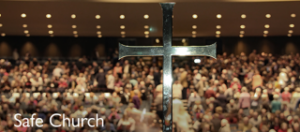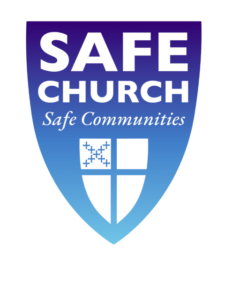Safe Church, Safe Communities
The Episcopal Church and the Diocese of Rhode Island recognize the potential for harm when a priest, lay employee or volunteer engages in sexual exploitation, harassment or abuse in one of our churches or institutions. Thus, we, like most Episcopal dioceses, offer training and resources that include suggestions for safe ways of interacting with children, youth and adults in the church.
We also provide “Intake Officers” who are trained to receive any allegations or concerns. Email intake@episcopalri.org to ask for a conversation with one of the Intake Officers.
ANNUAL SAFE CHURCH AUDIT DUE -September 1, 2024
Click Here for Audit Form
Safe Church Training
There are no in person trainings scheduled at this moment. You may look below for the Online Training Steps form to start your online training.
REGISTER BY CLICKING THIS LINK
Safe Church Training is a required certification program for clergy, all licensed lay ministers including Licensed Eucharistic Visitors, vestry/bishop’s committee members, employees, and those who volunteer in programs for children and youth. This training is also recommended for all lay people in leadership positions. The program is grounded in our call to seek and serve Christ in all persons and to respect the dignity of every human being. The clergy and vestries of each individual church are responsible for oversight of their parishioners and staff who need to take the training. 
Contact your parish priest or parish administrator for access to the training or access the training using the steps below. Safe Church, Safe Communities training is offered primarily as an online program. In-person trainings are scheduled occasionally at locations around the diocese. Watch for notices in the diocesan e-newsletter or speak to diocesan administrator Mary Ann Mello to learn when the next in-person training will be held.
If you need help setting up a Safe Church, Safe Community Program in your church or to revitalize your current program, please contact Mary Ann Mello at maryann@episcopalri.org
Requirements:
The National Church has updated training requirements and courses as of May 31, 2022. Please check below for new course requirements and screening recommendations.
Please look at the Screening Recommendation Chart for who needs Safe Church training and other requirements:
Screening Expectations Per Role
Please look at the Course Selection Chart to find the courses you need to take for your role:
Safe Church Training Courses per Role
To start your online training:
Step 1: Use this information to enroll and begin your online training:
1. Go to: https://www.praesidiumacademy.com/redeem
2. Fill in your contact information including First Name, Last Name, Email Address, and desired Password.
3. Enter the appropriate registration code for your organization. Find your code HERE
4. Click Validate to confirm registration code. (if you do not see your church, enter your church’s name in the search bar)
5. Click the checkbox to agree to the Terms & Conditions.
6. Click Redeem.
7. Write down your user login and password for future reference.
8. Answer the Registration Questions about your status and role within the organization.
9. Click Save & Continue.
10. To begin taking training immediately, scroll down and click a course to start the content.
Step 2: Use this information to log in:
1. Go to www.praesidiumacademy.com log in page
2. Enter your login and password.
3. Click LOGIN button.
4. On the next page, scroll down the page a bit until you see the courses listed.
5. Click the title of the course to open and view it.
If you are new to your role and the first time taking Safe Church, Safe Communities, please click
this Online Training Course Chart for the courses to complete for training.
To Renew Your Safe Church Training:
Every three years the Diocese of Rhode Island requires that your Safe Church Training to be renewed. You may renew your training by taking an in-person training being offered or take the five universal courses online:
Safe Church, Safe Communities: Introduction & Theological Background
Safe Church, Safe Communities: Organizational Rule & Policies
Safe Church, Safe Communities: Healthy Boundaries
Safe Church, Safe Communities: Inclusion
Duty to Report: Mandated Reporter
Resources
Mandated Reporting
All persons in Rhode Island are required by law (RIGL 40-11-3) to report known or suspected
cases of child abuse and/or neglect to the Department within 24 hours of becoming aware of such
abuse/neglect. Reports of abuse and neglect originate from several sources including the public,
courts, hospitals, police departments, parents, and relatives as well as other sources.
Child Protective Service-Rhode Island
CPS operates 24 hours a day, 365 days per year. Investigators receive and screen reports of
suspected abuse and neglect on the Department’s hotline 1-800-RI-CHILD (1-800-742-4453)
and conduct associated investigations, as needed.
Abuse and Elder Law Information Resources
Rhode Island law requires any person who has reasonable cause to believe that an elderly
person has been abused to report it to the Office of Healthy Aging (OHA). Failure to
report abuse of a person 60 or older can result in a fine of up to $1,000. Report suspicion
of Elder Abuse and Self Neglect to OHA 401-462-0555.
If a Senior needs help getting out of an abusive home contact the Saint Elizabeth’ s Haven
for Elder Justice Program 401-739-2844 x36
Reporting an incident of misconduct
To report an incident of misconduct by a lay volunteer or church employee in a parish, in addition to contacting any relevant civil authorities, please contact the priest of the parish.
To report an allegation of misconduct by a clergy person, in addition to contacting any relevant civil authorities (if this constitutes an illegal action), please contact either of the diocesan Intake Officers, who are responsible for beginning the Church’s own investigation process, or contact the Canon to the Ordinary.
Email intake@episcopalri.org to ask for a conversation with one of the Intake Officers.
You may also contact The Rev. Canon Dena Cleaver-Bartholomew, Canon to the Ordinary at dena@episcopalri.org or call 401-274-4500 or 401-480-8651 (cell). She serves as the Case Manager and will refer your case to one of the Intake Officers.



 The Bishop will license a lay person at the request of the priest in charge. In order to be considered for licensing, a lay person must be a confirmed communicant in good standing. The license is issued for three years and may require additional training before renewal.
The Bishop will license a lay person at the request of the priest in charge. In order to be considered for licensing, a lay person must be a confirmed communicant in good standing. The license is issued for three years and may require additional training before renewal.